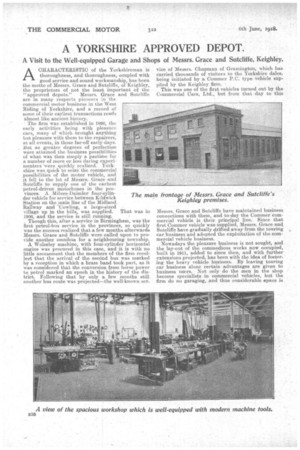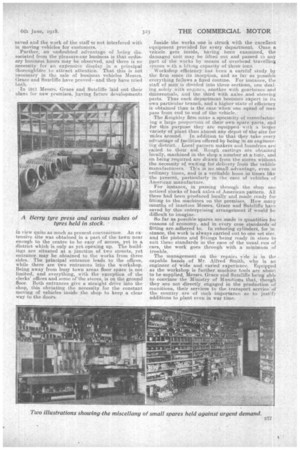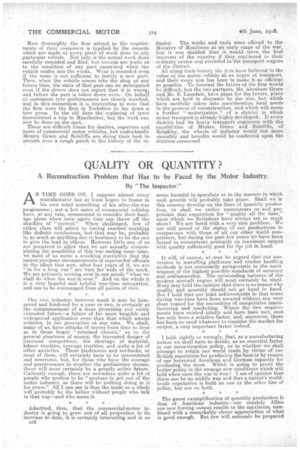A YORKSHIRE APPROVED DEPOT.
Page 14

Page 15

Page 16

If you've noticed an error in this article please click here to report it so we can fix it.
A Visit to the Well-equipped Garage and Shops of Messrs. Grace and Sutcliffe, Keighley.
ACHARACTERISTIC of the Yorkshireman is thoroughness, and thoroughness, coupled with good service and sound workmanship, has been the motto of Messrs. Grace and Sutcliffe, of Keighley, the proprietors of not the least important of the
" approved depots," Messrs. Grace and Sutcliffe are in many respects pioneers in the commercial motor business in the West Riding of Yorkshire, and a record of some of their earliest transactions reads almost like ancient history.
• The firm was established in 1896, the early activities being with pleasure cars, many of which brought anything but pleasure with them to the repairers, at all events, in those far-off early', days. But as greater degrees of perfection were attained the business possibilities of what was then simply a pastime for a number of more or less daring experi'rnenters were quickly realized. Yorkshire was quick to seize the commercial possibilities of the motor vehicle, and it fell to the lot of Messrs. Grace • and Sutcliffe to supply one of the earliest petrol-driven motorbuses in the, provinces. A M iln es-Daimler f our-Cylinder vehicle for service between Kildwick Station on the main line of the Midland Raclway and 'Cowling, a largo-sized village up in the hills, was supplied. 1906, and the service is still running. Though this, after a service in Birmingham, was the first petrol-bus service in the provinces, so quickly was the success realized that a few months afterwards Messrs. Grace and Sutcliffe were called upon to provide another omnibus for a neighbouring township.
A Wolseley machine, with four-cylinder horizontal engine was procured in this case, and it is with -ho little amusement that -the members of the firm recollect that the arrival of the second bus was marked by a reception in which a brass band took part, as it was considered that the conversion from horse power to petrol marked an epoch in the history of the district. Following that by only a few months still another bus route was projected—the well-known ser
That was in vice of Messrs. Chapman of Grassington, which has carried thousands of visitors to the Yorkshire dales, being initiated by a Commer P.C. type vehicle supplied by the Keighley firm.
This was one of the first vehicles turned out by the Commercial Cars, Ltd., but from that day to this Messrs. Grace and Sutcliffe have maintained business connections with them, and to-day the Commer coinmercial vehicle is their principal line. Since that first Commer vehicle was supplied, Messrs. Grace and. Sutcliffe have gradually drifted away from the touring car business and adopted the exploitation of the commercial vehicle business. .
Nowadays the pleasure business is not sought, and the lay-out of the commodious works now occupied, built in 1911, added to since then, and with further extensions projected, has been with the idea of fostering the heavy vehicle business. By leaving touring car business alone certain advantages are given to business users. Not only do the men in the shop become specialists in commercial vehicles, but the firm do no garaging, and thus considerable Apace is 'saved and the work of the staff is not interfered with iii moVingvehicles for customers.
Further, an undoubted advantage of being dissociated from the pleasure-car business is that ordinary business .hours may be observed, and there is no necessity for an expensive display in a principal thoroughfare to attract attention. That this is not necessary in the sale of business vehicles Messrs. Grace and Sutcliffe have proved—and they have tried both.
In 1911 Messrs. Grace and Suteli.ffe laid out their Plans for new premises. having future developments in view quite as much as present convenience. An extensive site was obtained in a part of the town near enough to the centre to be easy of access, yet in a district which is only as yet opening up. The buildings are situated at a junction of two streets, yet entrance may be obtained to the works from three sides. The principal entrance leads to the offices, while there are two entrances into the workshop. being away from busy town areas floor space is not limited, and everything, with the exception of the clerks' offices and some orthe store's, is on the ground floor. Both entrances give a straight drive into the shop, this obviating the necessity for the constant moving of vehicles inside the shop to keep a clear way to the doors. Inside the works one is struck with the excellent eqUipment provided for every department. Once a vehicle, gets inside, having been examined, the damaged unit may be lifted out and passed zo any part of the works by means of overhead travelling cranes w,th a lifting capacity of three tons.
Workshop efficiency has been a earefut study by the firm since its inception, and as far as possible everything follows a fixed routine. For instance, the staff of men is divided into three sectionS, one dealing .solely with engines, another with geartaixe.s and differentials, and the third with axles and steering parts. Thus each department becomes expert in its own particular branch, and a higher state of efficiency is obtained than is the case when one squad of men pass from end to end of the vehicle.
The Keighley firm make a speciality of manufacturing a large proportion of their own spare parts, and for this purpese they aro equipped with a larger variety of plant than almost any depot of the. size foi.i miles around. In addition to that they take every advantage of facilities offered by being in an engineering district. Local pattern makers and foundries arecalled . to their aid. Rough castings are obtained locally, machined in the shop a number at a tirrie, and on being required are drawn from the stores without the necessity of waiting for delivery horn the vehicle manufacturers. This as_ no small advantage, even in ordinary timesr and is a veritable boon in-times like the present, particularly in the case of vehicles of American manufacture.
For instance, in passing through the shop one noticed stocks of back axles of American pattern. All these had been produced locally and made ready for fitting to the machines on the premises. How many months of inaction Messrs. Grace and' Sutcliffe have saved by this enterprising arrangement if would be difficult to imagine., So far as possible spares are made in quantities for reasons of economy, and in every case standards of fitting are adhered to. In reboring cylinder, for instance, the work Ur alWays carried out to one set size. and the pistons and fittings being ready in store to suit these standards in the ease of the usual run of cars, the work goes through with a minimum of trouble.
The management on the repairs aide is in the capable hands of Mr. Alfred Smith, who is an engineer of wide and varied experience. Equipped as the workshop is further machine tools are about to be supplied, Messrs. Grace and Sutcliffe being: able to convince the Ministry of Mimitions that, thmigh they are not directly engaged in the production of munitions, -their services to the transport service of thecountry are of such • importance as to instill' additions to plant even in war time.
How thoroughly the firm attend to the requirements of their customers ia typified by the records which are made of every piece of work done to any particular vehicle. Not only is the actual work done carefully recorded and filed, but records are made as to the condition of any .part examined when the vehicle conks into the works. Wear is recorded even if the wear is not sufficient to justify a new part. Then, when the vehicle comes into the shop at any future time, the state of that part can be anticipated even if the driver does not report that it is wron, and before the part is taken down even. On behalf of customers tyre performances are closely watched, and in this connection it is interesting to note that the firm were the first in Yorkshire' to lay down a tyre press. In the old days the replacing of tyres necessitated a trip to Manchester, but the work can now be done on the spot.
These are difficult times f or dealers, repairers and users of commercial motor vehicles, but undoubtedly Messrs. Grace and Suteliffe are doing their best to smooth Over a rough patch in the history of the in dustry. The works and tools were -offered to the Ministry of Munitions at an early stage of the war, but it was decided that it would serve the best interests of the country if they continued in their ordinary course and attended to the transport wagons of the district.
All along their history the firni have believed in the value of the motor vehicle as an organ of transport, and their every aim has been to make it as efficient as possible. To forecast the future of the firm would be difficult, but the two partners, Mr. Abraham Grace and Mr. K Lonsdale, have plans for the future, plans which are held in abeyance: by the ssar, but which have carefully taken into consideration local needs in the process of reconstruction, and which will mean a further " motorization" of a district in which motor transport is already lighly developed. If every district had its heavy transport engineers with the capabilities of Messrs. Grace and. Sutcliffe, of Keighley, thewheels of industry would run more smoothly and benefits would be 'conferred upon the districts col:teemed






















